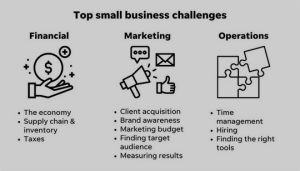Starting a small company can be an exciting venture, but it comes with various challenges. Here are some common challenges that entrepreneurs often face when launching and building a small business:

The Challenges of Starting a Small Company
-
Table of Contents
ToggleLimited Capital:
- Financial Constraints: Limited funds can make it challenging to cover startup costs, operate the business, and sustain operations during the early stages.
-
Market Competition:
- Competitive Landscape: Small businesses often enter markets with established competitors, requiring them to find ways to differentiate their products or services.
-
Risk Management:
- Uncertainty: The inherent risk in starting a business, coupled with economic uncertainties, can create challenges in predicting and managing risks effectively.
-
Market Validation:
- Product/Market Fit: Ensuring that there is a demand for the product or service and achieving a proper fit in the market can be a significant challenge.
-
Marketing and Branding:
- Visibility: Building brand awareness and marketing a new business can be difficult, especially with limited resources.
-
Regulatory Compliance:
- Understanding Regulations: Navigating complex regulatory environments and ensuring compliance with local, state, and federal laws can be challenging for new entrepreneurs.
-
Talent Acquisition:
- Finding the Right Team: Attracting and retaining skilled and motivated employees can be difficult, particularly when competing with larger companies for talent.
-
Time Management:
- Multiple Roles: Entrepreneurs often wear multiple hats, juggling various responsibilities, which can lead to time management challenges.
-
Customer Acquisition and Retention:
- Building a Customer Base: Acquiring the first customers and retaining them can be a hurdle, especially when competing with established brands.
-
Technology and Innovation:
- Adapting to Technology: Staying abreast of technological advancements and incorporating them into the business model can be challenging for small businesses.
-
Cash Flow Management:
- Balancing Finances: Managing cash flow effectively is crucial, especially during the early stages when revenues may not be consistent.
-
Scaling:
- Growth Challenges: Scaling the business while maintaining quality and efficiency can be a delicate balance that requires strategic planning.
-
Legal Issues:
- Contracts and Agreements: Handling legal matters, such as contracts, agreements, and intellectual property protection, can be complex and require legal expertise.
-
Adaptability:
- Market Changes: Being adaptable to changes in market trends, consumer behavior, and industry dynamics is essential for long-term success.
-
Emotional Stress:
- Pressure and Stress: The emotional toll of entrepreneurship, including the pressure to succeed and the stress associated with uncertainty, can impact an entrepreneur’s well-being.
Despite these challenges, many small businesses thrive and succeed by addressing these issues with resilience, strategic planning, and a commitment to learning and improvement. Seeking advice from mentors, leveraging networking opportunities, and staying informed about industry trends can help entrepreneurs navigate the challenges of starting and growing a small company.
